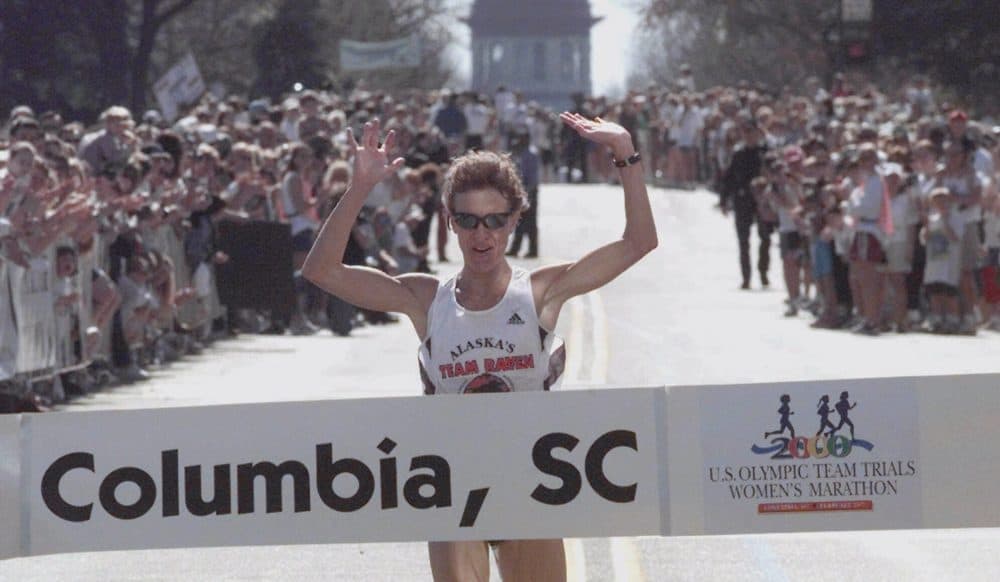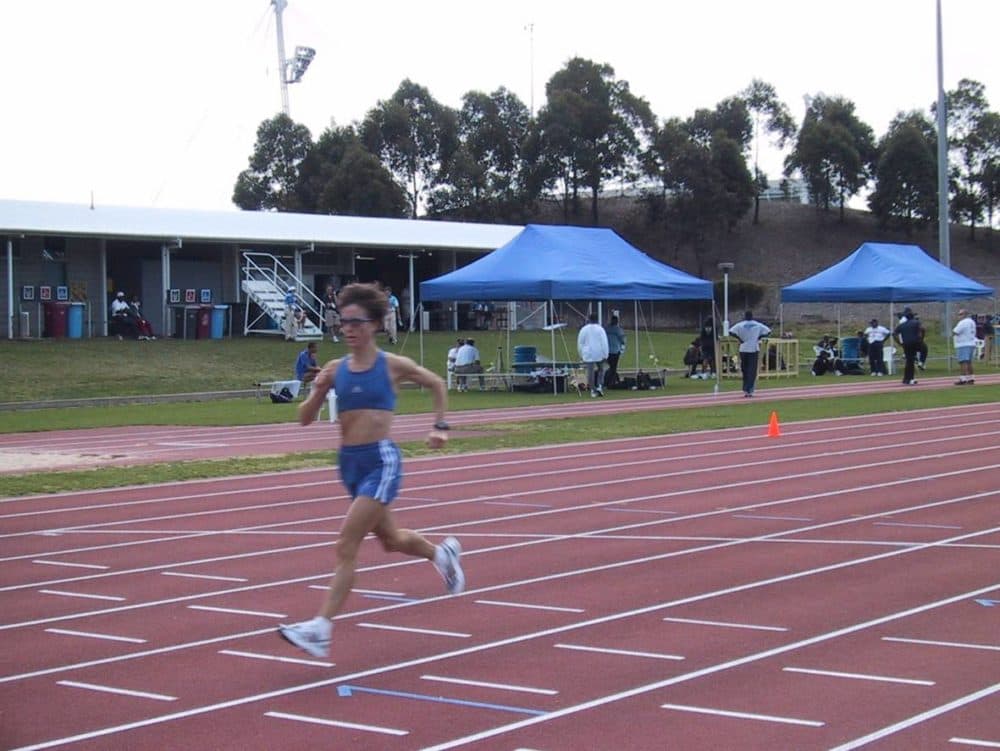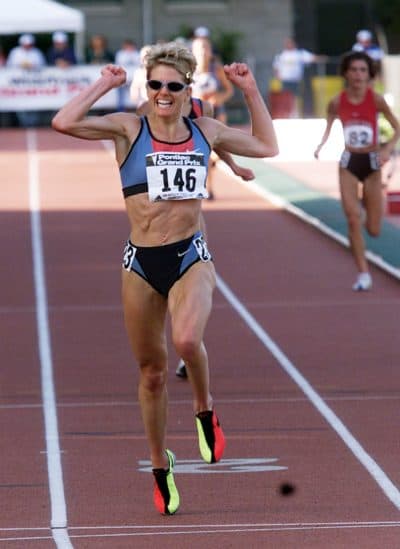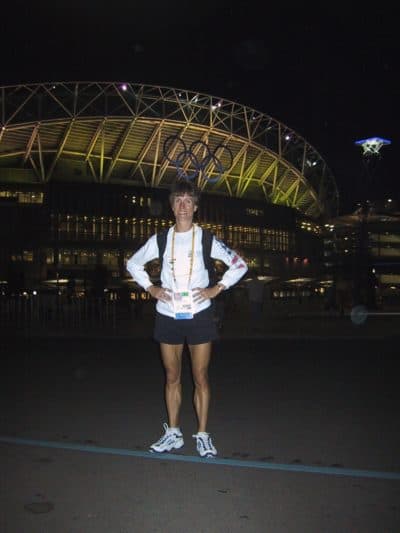Advertisement
How A 37-Year-Old Marathoner Unexpectedly Qualified For The 2000 Olympics

Chris Clark had run fast enough to qualify for the 2000 Olympic Trials Marathon, where the winner of the race would automatically earn a spot on the U.S. Olympic team.
But Chris knew her chances of winning the trials were about 0%. She had been working with a coach. But, other than that, her running life was very different from the top U.S. marathon runners. She wasn’t sponsored. She was a wife and mother of two young boys. She worked three days a week as a pathologist at a medical center. And she was 37, one of the oldest runners in the race.
But Chris was a fan of the Olympics, going back to childhood.
"Oh, I was an Olympic junkie," Chris says. "Gosh, I watched every summer Olympics every four years growing up. I don’t know that I actually ever had real aspirations of being an Olympian. But I think everyone who watches the Olympics sort of has that inner dream of being an Olympian one day."
"I think everyone who watches the Olympics sort of has that inner dream of being an Olympian one day."
Chris Clark
Through high school and college, Chris ran cross country and track. And she’d been competitive — fast enough to earn a scholarship to Montana State University. But she had other priorities.
"After college, I went to medical school and basically just did recreational running, what time allowed for," Chris says.
And Chris’s first marathon? It wasn’t even her idea.
"My husband had qualified for the Boston Marathon. And he cajoled me into training for my first marathon."
As Chris describes it, she was not in marathon shape. So she did an accelerated training program. And, at the Napa Valley Marathon, she ran fast enough to get into Boston.
"Six weeks later, we went to Boston and ran the Boston Marathon," Chris says. "Then we didn’t run a marathon again for a long time."
Trials
After her medical residency, Chris moved with her husband and their two young boys to Anchorage. And she managed to find ways to keep running.
"[I] had a running stroller, and put the kids in the running stroller. And we started running more with the kids," Chris says. "And I got stronger.
"And we were doing local running races. Anchorage is a very active community. It’s sort of a truncated running season, just because we have a very long winter here. But, at some point, I got reconnected with running marathons again."

Chris got stronger and faster. She qualified for the 1996 Olympic Trials Marathon, where she placed 76th. Heading into the 2000 trials, she set reasonable goals for herself.
"I think I was seeded in the top 25," Chris says, "and I remembered from the first time I had gone that the top 20 went to the podium. They had a ceremony after the race, and the top 20 were honored. So that was my goal. And I thought, 'Oh, if I had a really great day, I could make it into the top 10.' "
Chris's best marathon time was 12 minutes slower than the top qualifier. Also, the trials were in February, and Chris lived in Alaska. She spent a lot of time training on the treadmill at home.
Chris was disciplined, but she trained less than most elite marathoners did. She was running 60 to 70 miles a week, while they were putting in 30 to 40 miles more.
And then there was this: the trials were in South Carolina, where it’s hot, and the course was hilly.
Advertisement

"I didn’t worry about the hills, because I changed the elevation on my treadmill," Chris says. "And I didn’t worry about the weather, because I planned on hydrating thoroughly on the course. I have a really strong mindset, and I don't get rattled by things like that. So those kind of variables don’t really bother me. I knew we were all doing the same thing."
Running Her Own Race
On race day, Chris lined up with 170 other women. The field included favorites like top qualifier Libbie Hickman, sub-2:33 marathoner Kristy Johnston and Anne Marie Lauck, who’d placed 10th at the 1996 Olympic Marathon.
"I really wasn’t all that focused on them, because I just felt like I had come to do my own race," Chris says.
The leaders went out faster than Chris had planned to go.
"A couple of those women I know got out of sight, and that didn’t bother me. That happens in every race, and you just let those people get away. You gotta run your own pace."
The temperature climbed to over 80 degrees. It was humid. But Chris remained steady. She stuck to her 5 minute, 47 second pace, as other runners began to fade. By mile 17, there was only person ahead of her: former Olympian Lauck, who’d been on a solo flier since around mile four.
"I think I caught Anne Marie Lauck at about mile 20. And, right after I caught her, I went by my coach, and I gave him the thumbs up sign," Chris says. "And he gave me the thumbs up sign, and I felt just fine at that point. I really just felt strong and confident and, you know, it was a good feeling."
But Chris also knew anything can happen in a marathon. You can run out of energy. You can cramp. Nausea is common, especially in the heat. But Chris kept powering through those last miles. Her lead looked solid.
So what was going through Chris's head as she was in the lead?
"Oh, gosh, I was really excited!" Chris says. "Somewhat incredulity. Because I sure didn’t expect to be there at that point, holding it all together. But I also had faith in myself. And I felt strong."
"I sure didn’t expect to be there at that point, holding it all together. But I also had faith in myself. And I felt strong."
Chris Clark
Chris says the last half mile of race, if not more, was on a straightaway.
"And I did turn around, and I realized there was no one behind me. And, yeah, I was almost in tears. And, by the time I got to the finish line, I was in tears," she says. "I did realize I was going to the Olympics. And I can’t even tell you how exciting that moment was."
Chris had gone into this race hoping for a top-20 place, maybe top 10. And she’d finished first. She’d improved her fastest marathon time by over seven minutes, in tough conditions, and she’d won a spot on the Olympic team.
'A Surreal Moment'
"I think I was just bawling there for a little bit, because, like I said, I was this kid who grew up watching the Olympics every four years," Chris says. "And then, all of a sudden, it was me going. And no one ever thought it was going to be me going."
Chris soon found herself in another unexpected position: at the center of a press conference. It was another first for her.

"Yeah, that was kind of a surreal moment, too. Because I think there were all these women in the room who were looking at me, like, 'Who is this person?' Because they all knew each other. So I think they were all looking at me, like, 'How did she win this?' "
The word began to spread that a 37-year-old doctor, wife, and mother of two from Alaska had won the Olympic Trials.
"And then I just got a lot of letters from working moms about 'What a great inspiration you were.' And, 'This just gives me such hope, and gets me out of bed in the morning,' " Chris says. "And I got them from men, too, honestly. There are cross-country skiers here in town who were Olympians, who thought that their Olympic careers were over at age 35. And then I did this, and they said, 'You know, I’m going to go back and it give another shot. Because you could do this, and I think I can go back and try this again, too.' "
Chris’s 6- and 9-year-old sons had a different reaction.
"They’re not that impressed with mom," Chris says. "They were like, 'Olympics, schmimpics. Whatever.' What it meant to them was, 'Hey, we get to miss school for three weeks.' "
At the Sydney Olympics, Chris improved her personal best time by another two minutes and earned a respectable 19th place. And, all these years later, Chris Clark still understands what a long shot her experience was.
"It was just too exciting, almost, to be believed," Chris says. "You know, if you'd been betting in Vegas, I would have been a good bet. I'd have brought some money home for someone."
We first learned about Chris Clark’s Olympic Trials upset in the Fast Women newsletter.
This segment aired on March 7, 2020.